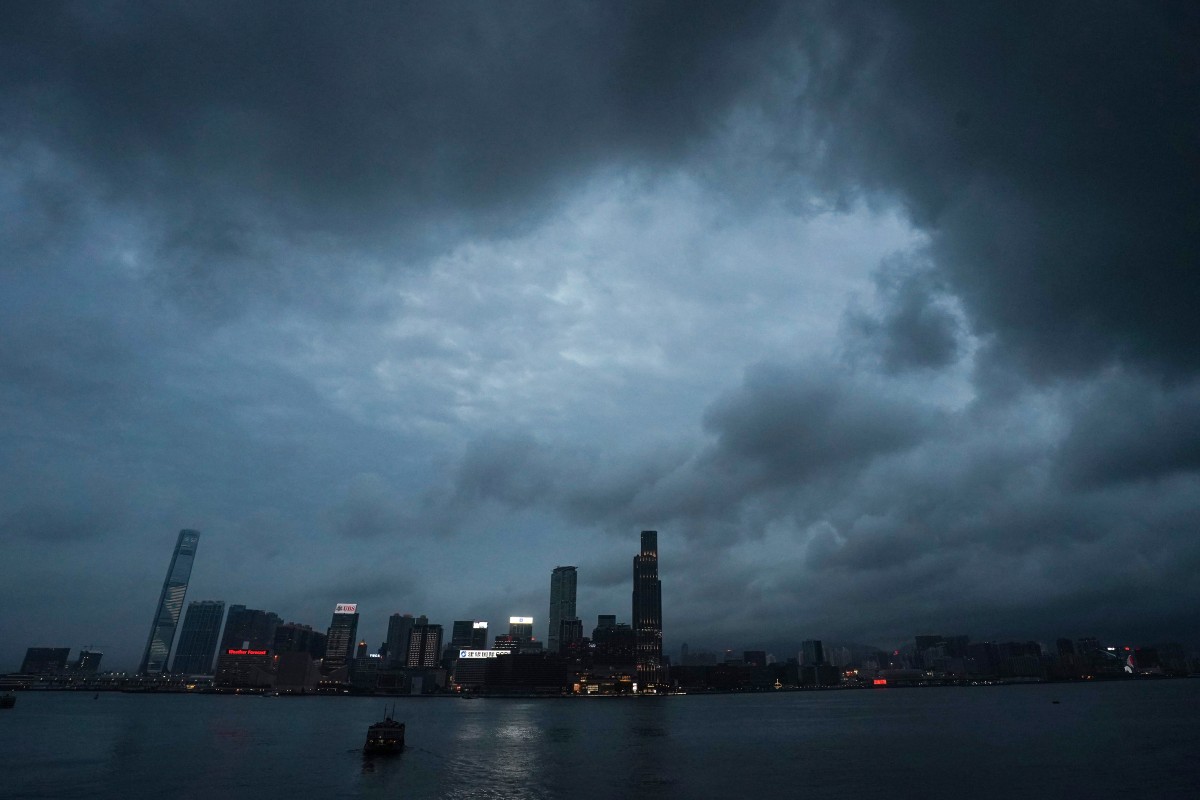A gateway to China, Hong Kong also serves as an important regional hub for America’s largest lenders
American banks accounted for about 5 per cent of total assets in the city last year, according to HKMA
THIS WILL APPLY TO CANADIAN BANK'S OPERATING OUT OF HONG KONG
https://en.wikipedia.org/wiki/List_of_banks_in_Hong_Kong
Chad Bray Published: 29 May, 2020 SCMP

It would be a ‘serious mistake’ to jeopardise Hong Kong’s special status, which is fundamental to its role as an attractive investment destination and international financial hub, the US Chamber of Commerce said this week. Photo: Felix Wong
A gateway for capital flowing in and out of mainland China, Hong Kong has for decades also served as a lucrative regional hub for America’s biggest banks operating in Asia.
But, rising tensions between the United States and China are threatening to leave foreign lenders – and billions of dollars in potential revenue as the mainland’s financial services industry opens up further – stuck in the middle.
On Wednesday, US Secretary of State Mike Pompeo said Hong Kong no longer maintained a “high degree of autonomy” from China, after the National People’s Congress (NPC) said it would adopt new national security legislation tailor-made for the city following months of anti-government street protests. The resolution was passed by a near unanimous vote on Thursday.
The Trump administration has not said what actions it might take in response other than President Donald Trump saying he planned to do “something” this week. The declaration represents the latest firestorm, as relations have deteriorated dramatically between the world’s two biggest economies in recent years.
“We expect the latest move to have considerable implications for the city, with the threat of higher tariffs, sanctions, as well as tougher investment and visa rules between Hong Kong and the US, including potential sanctions on businesses – particularly banks – operating in the city found to be supporting anyone in violation of the ‘one country, two systems’ model,” said Benjamin Quinlan, managing partner of consultancy Quinlan & Associates.
The US was Hong Kong’s second-largest trading partner after mainland China, according to Hong Kong’s Trade and Industry Department. American banks accounted for 5 per cent of the banking sector in the city in 2019, with about US$166 billion in total assets, according to the Hong Kong Monetary Authority, the city’s de facto central bank.
Since Hong Kong was returned to China in 1997, the special administration region has held a special status with the US, allowing it as a free port to avoid tariffs the US has placed on China and to import goods the US has restricted from being shipped to the mainland.
“It would be a serious mistake on many levels to jeopardise Hong Kong’s special status, which is fundamental to its role as an attractive investment destination and international financial hub,” the US Chamber of Commerce said on Tuesday.
The US response could range from sanctioning individuals and Chinese companies – including Hong Kong’s members of the NPC – and restricting visas to the “nuclear option” of using the International Emergency Economic Powers Act (IEEPA) to prevent future investment or transfer of funds to Chinese-related entities or persons.
Enacting the IEEPA would require the president to declare that there is an unusual and extraordinary threat to the US and consult Congress. It has typically been used to sanction countries that fund terrorism, or which are developing nuclear weapons, such as North Korea.
Martin Petch, senior credit officer in the sovereign risk group at Moody’s Investors Service, said changed international perceptions of Hong Kong could add downward pressure to the city’s credit rating. “This will particularly be the case if the international response, in turn, leads to a weakening of Hong Kong’s role as an international economic and financial centre,” he said.
For US banks, Hong Kong has been a significant hub for corporate and investment banking, both inside and outside mainland China, and, increasingly, wealth management, as China has grown wealthier.
Last year, American banks played key roles in some of the biggest listings in the city. Hong Kong has led global fundraising for seven of the past 11 years.
Citigroup, JPMorgan and Morgan Stanley all served as joint global coordinators for Alibaba Group Holding’s US$12.9 billion secondary listing in Hong Kong, the biggest listing in the city and the second-largest globally in 2019. JPMorgan and Morgan Stanley also were joint sponsors of the US$5.7 billion initial public offering last year of Budweiser Brewing Company APAC, the Asia-Pacific arm of Anheuser-Busch InBev.
Chinese technology companies JD.com and NetEase are preparing for their own secondary listings in the city later this year.
American banks accounted for 19 per cent of investment banking fees booked in Hong Kong last year, or about US$309.8 million, according to data provider Refinitiv. Overall, investment banks earned US$1.63 billion in fees last year.
Citigroup, which also operates 16 retail banking branches in the city, traces its history in Hong Kong back to 1902. The city serves as one of its main hubs in the Asia-Pacific region, with about 4,500 employees, and accounted for about 15 per cent of the bank’s revenue in the region.
The bank, which does not break out its results for Hong Kong, reported US$1.58 billion in profit from continuing operations in its global consumer bank in Asia last year, and profit from continuing operations of US$3.46 billion in its institutional clients business. Its regional chief executive is based in Hong Kong.
“Citi’s exposure to Hong Kong includes top local corporates and US and [multinational] names, and is around 3 per cent of our total exposure,” a bank spokesman said. The bank is monitoring events closely in Hong Kong and remains committed to the city, the spokesman said. The bank’s deposits and loans have increased in Hong Kong in the past year and it has not seen capital flight from the city, he added.
The city also serves as the regional headquarters for Bank of America, Goldman Sachs and Morgan Stanley. JPMorgan’s Asia-Pacific CEO, who oversees 17 markets in the region, is based in Hong Kong.
Goldman employs about 1,700 people in Hong Kong and another 250 onshore in mainland China, with most of the regional business heads at Goldman based in the city. Overall, Asia-Pacific accounted for 13 per cent of its revenue last year, or about US$4.65 billion.
Morgan Stanley has about 2,000 employees in the city, and Asia-Pacific as a whole accounted for US$5.13 in revenue in 2019, or about 17 per cent of the bank’s total revenue.
Like many of their American and European rivals, Goldman, JPMorgan and Morgan Stanley have moved to take majority control of their securities operations in mainland China in the past year, as Beijing has relaxed foreign ownership rules for securities firms, asset managers and insurance companies.
The opening of mainland China’s financial services sector, however, is not expected to represent a shift of personnel out of Hong Kong, but an opportunity to access the country’s domestic market, bankers said. Capital controls in mainland China mean Hong Kong will remain an attractive market for Chinese companies seeking to access foreign investors, they said.
Rising US-China tensions and the return of protests to Hong Kong’s streets over the national security law have also renewed questions about Hong Kong’s future attractiveness to expats.
“For much of my time here, it was seen from an earnings, career and lifestyle perspective as one of the best places in the world to work in financial services. A very attractive kind of career destination city,” said John Mullally, regional director for southern China and Hong Kong financial services at search firm Robert Walters. “That has definitely changed. The protests have played a big part in that.”
However, the lifestyle afforded to financial services workers in the city still makes it an attractive location for expats, according to Abimanu Jeyakumar, head of North Asia at headhunter Selby Jennings.
“At the moment, with the new bill being passed, it does cause another barrier to overcome when it comes to relocating staff,” Jeyakumar said. “[Hong Kong has] always been a conduit for Chinese investments into the international market and international investments into China. I think a lot of banks are waiting to see how this plays out. This could bode an opportunity, or a challenge.”
Additional reporting by Alison Tudor-Ackroyd.

Chad Bray
Chad is a senior business reporter focused on finance. He has previously written for The New York Times, The Wall Street Journal and Dow Jones Newswires.
No comments:
Post a Comment